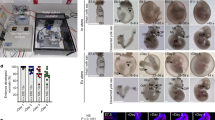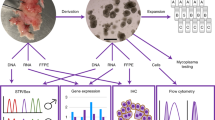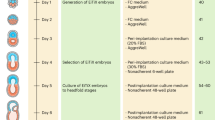Abstract
MOUSE and rat embryos explanted at head-fold or early somite stages can be grown in culture for periods of two or three days1,2. We have now used similar methods for younger rat embryos, explanted at 7.5–8.5 days of gestation. At this stage the embryos (“egg-cylinders”) have implanted in the uterine wall (implantation in the rat occurs at about 6.5 days) and have developed an ectoplacental cone, but no organ rudiments have yet formed.
This is a preview of subscription content, access via your institution
Access options
Subscribe to this journal
Receive 51 print issues and online access
$199.00 per year
only $3.90 per issue
Buy this article
- Purchase on Springer Link
- Instant access to full article PDF
Prices may be subject to local taxes which are calculated during checkout
Similar content being viewed by others
References
New, D. A. T., J. Embryol. Exp. Morphol., 17, 513 (1967).
New, D. A. T., in Methods in Mammalian Embryology (Freeman, San Francisco, 1969).
Goss, C. M., J. Exp. Zool., 72, 33 (1935).
Daniel, J. C., in Methods in Mammalian Embryology (Freeman, San Francisco, 1969).
Author information
Authors and Affiliations
Rights and permissions
About this article
Cite this article
NEW, D., DANIEL, J. Cultivation of Rat Embryos explanted at 7.5 to 8.5 Days of Gestation. Nature 223, 515–516 (1969). https://doi.org/10.1038/223515a0
Received:
Issue Date:
DOI: https://doi.org/10.1038/223515a0
This article is cited by
-
Histogenetic capacity of rat and mouse embryonic shields cultivatedin vitro
Wilhelm Roux' Archiv für Entwicklungsmechanik der Organismen (1973)
-
Improved Development of “Rat Egg-Cylinders” in vitro as a Result of Fusion of the Heart Primordia
Nature New Biology (1972)
-
Culture of Rabbit Blastocyst in a Medium with a Convection Current
Nature (1972)
-
In vitro culture of somite stage rat embryos: A new technique for maintaining growth and continuously monitoring heart rate
In Vitro (1972)
-
Culture of Rabbit Embryo in Circulating Medium
Nature (1970)
Comments
By submitting a comment you agree to abide by our Terms and Community Guidelines. If you find something abusive or that does not comply with our terms or guidelines please flag it as inappropriate.



